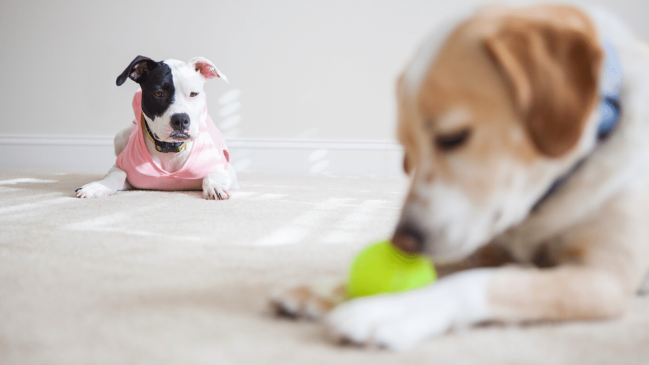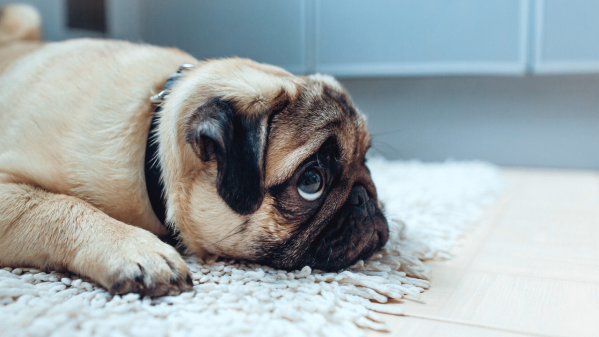You may have seen it before: your dog giving you that look from across the room. We know our dogs love us unconditionally, which is a wonderful thing. Sometimes that love, however, can cause some dogs to get jealous if their owner’s attention gets pulled in different directions.
Wondering if your dog is jealous or what you can do about it if they are? Read on to learn more about what makes a dog jealous, how you can spot the signs, and what you can do to lessen your pup’s envious feelings.
Signs your dog is jealous
Excessive barking
Grunting and growling
Aggression
Destructive behavior
Overgrooming
Crowding your space
Going to the bathroom inside
Bouts of depression
Doing tricks/trying to impress
Think your dog may be jealous of that new pet, person, or hobby in your life? Some common signs of pup jealousy include barking or grunting and agitated behavior like pulling on a leash.
"Your dog may be jealous with a new introduction into the household like a new pet or child," explains Dr. Deirdre Frey, founder of the house call veterinary practice Vet At Your Door. "Dogs can often show active signs of jealousy by blocking access to the new addition or wedging their way in between the two of you. Occasionally and unfortunately, they may display aggression due to competing over resources — you. They can also have passive manifestations of jealousy, such as anxiety or depression."
Reasons your dog may be jealous
New pet in the household
New baby in the household
Perceived lack of attention
Changing schedule
Change to the primary caregiver
Having to guard their possessions
The thought of you petting other dogs
As Dr. Frey mentions above, getting an additional pet like a dog or a cat, or having a baby join the family are major reasons why a dog may become jealous. A recent study by Psychological Science reveals that dogs can get jealous from even the thought of their owner interacting with another apparent dog.
"Dogs can get jealous from even the thought of their owner interacting with another apparent dog."
"Research has supported what many dog owners firmly believe — dogs exhibit jealous behavior when their human companion interacts with a potential rival," the study’s lead author, University of Auckland’s Amalia P. M. Bastos, said in the paper. Bastos' team demonstrated this by having a dog’s owner sit next to a realistic-looking mechanical dog. The researchers then placed a panel between the dog and the person, preventing the real dog from seeing their owner. Even without seeing their loved one with another pup, however, the dogs still exhibited jealous behavior, supporting the statement that dogs can hold on to jealous feelings even when the thing that would make them jealous isn't in front of them.

Other territorial behaviors in dogs
Dogs can also seem jealous if they very possessive of things they find of high value, whether that be their food, their favorite toy or their dog bed. This phenomenon where a dog feels like they have to guard their prized possessions from others is called resource guarding. If your dog suffers from this, it’s important to make sure no child or other dog approaches the nervous pup when they have these items near them. If you think your pup has a tendency to do this, it might be worth looking into behavioral training to make your dog less possessive.
Tips & tricks for dealing with dog jealousy
So you’ve determined that your dog is truly jealous with a new pet or baby joining your household; however, what can you do? "It’s important when a new addition comes, that you take care to spend quality time with your dog alone doing their favorite thing," Dr. Frey recommends. "This gives them the security they’re craving. It’s also important to do fun things together as your new family, such as a walk together, a few times a day. It’s in the passive 'togetherness,' in a non-threatening manner, that can help bond the old and new.”
If you’re bringing another furry friend into the house, also make sure that each dog — the new and the old — has their own "safe area," whether that be a bed or a crate where they can feel relaxed. It's also helpful to make sure that you praise your pup when they have positive interactions with a new pet or baby. On the flip side, it’s also not good to punish a dog if they start growling — your dog is doing so because they are uncomfortable, and as their owner, it’s important to listen to what their behavior is telling you and respond accordingly.
How to stop your dog from being jealous
Resolving jealous behavior can take time and patience for all parties, and it’s important to stay vigilant and note when jealous behavior occurs so you can see what triggers that behavior and also make sure that it doesn’t escalate.
"It’s helpful to take your time and not rush the process," Dr. Frey says. "Let them get to know each other slowly and non-threateningly. Keep toys that either party could get possessive over away from the mix. Feed the two parties separately at first. And if anyone displays any aggressive tendencies, it’s important to contact your veterinarian right away and discuss training options as this can progress to a dangerous situation very quickly."
A jealous dog may not be fun for anyone, but the important thing to remember is that their behavior comes from not feeling comfortable — if you take steps to make them at ease in their "new normal" and also make sure to get additional support when needed, you, your dog, and your growing family will hopefully become comfortable with each other and happier for it.
